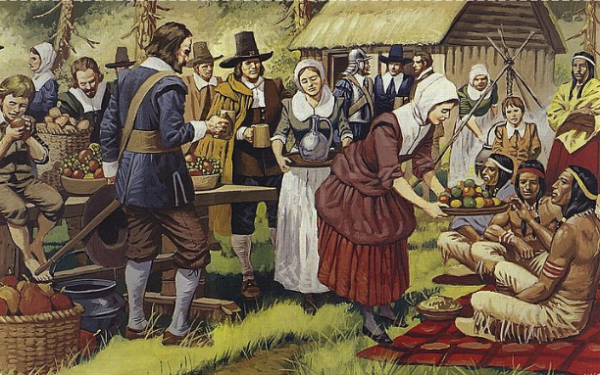
On Thanksgiving Eve the Los Angeles Times featured an article penned by one of its journalists, chronicling her challenges in relating to the traditions of the holiday. Basically she saw the Thanksgiving holiday as an homage to the triumph of colonialism, akin to our former celebration of Columbus Day.
Her family had fled the murderous civil war that had ravaged El Salvador in the 1980s. She married an Angelo of Armenian descent. Neither felt too connected to Norman Rockwell vision of the family gathered around the holiday turkey or the myths that Disney-ized the Pilgrims. She and her spouse declined to celebrate the holiday and enjoyed the holiday as a day of restful contemplation.
But then those quite days of reflection were disrupted by the arrival of children, and they felt that they were being pressured to celebrate a holiday that held little meaning for them. Their solution was to use the day to teach their small children about the horrors of the Armenian holocaust and the atrocities of the Salvadoran civil war.
Generally I try not to pass judgment on people’s parenting choices, but it just seems to me that kids growing up today are already burdened by the challenges of global warming, globalization, income disparity, automation, and dysfunctional democracy. Do you really need to load your kids up with any more “stuff”? Yes kids should know their family’s history, but don’t young kids have enough on their plate? Is the tenor of the times so dark and pessimistic that you can’t put a positive spin on an innocuous secular holiday?
I grew up celebrating Thanksgiving in a way that embraced both our family’s culture as well as celebrating a uniquely American holiday.
I am Irish on my father’s side and Mexican/Chinese/Filipino on my mother’s. Based upon the same analysis that dictated the half Irish Barak Obama was our first black president, I would be considered a person of color.
We celebrated the holidays at my maternal grandmother’s home in Van Nuys. Her second husband was essentially my grandfather. Although both my grandparents were native-born, Spanish was their first language and they were fiercely proud of their Mexican roots. On the other hand, World War II forged an intense sense of being American. My grandmother worked 60 hours a week at two jobs at Boeing and Lockheed during the War. Being a Rosie Riveter suddenly thrust her into a new world filled with young Anglo women, whose first language was English. Her new friends thought she was exotic, nicknaming her “Shanghai.” When they weren’t working they were down at the USO dancing, feeling that partying with the sailors and servicemen was a patriotic duty. After the war my grandmother took her earnings and opened up a beauty shop, her co-workers becoming her customers.
The war had also transformed her husband, who went from being a poor Mexican kid from the wrong side of tracks in San Fernando to fighting in the Battle of the Bulge under Patton. He flaunted his patriotism by insisting that every Saturday night; dinner would be a huge porterhouse steak, rare, with steak fries, accompanied by my grandmother’s chorizo leavened frijoles.
We celebrated the holidays at their home. Tamales are our tradition for Navidad, but Thanksgiving is an American holiday thus mandating a menu featuring America’s indigenous bird.
My grandmother would always have an enormous turkey, pushing 30 pounds, swaddled in bacon. During the War she leaned to make excellent stuffing and turkey gravy. The “pavo,” as she referred to the turkey, was served with mashed potatoes, yams with marshmallows and ever-present family favorite, fried frijoles. There were biscuits for my dad and handmade tortillas for the rest of us. None of the guests left the house without being loaded down with leftovers.
While we learned the standard Thanksgiving Pilgrim story at school, we never put a lot of weight to it. From our family point of view, the indigenous Americans, who were essentially Mexicans living in New England, fed the starving white people at Plymouth by bringing gifts of turkey and venison to the first Thanksgiving; they saved the Pilgrims and played a key role in the founding of this country. Anyway, this is the Thanksgiving myth that works for my family.
So let’s not get too caught up in political correctness. While it is important to remember history and not forget the suffering of Native Americans and people of color during the creation of our county, we can’t let it consume a holiday that is essentially about selfless generosity. Those indigenous folks had no real reason to feed those strange and acquisitive Europeans stranded on the far shores of the Atlantic. But their decision to feed the hungry makes one of our nation’s founding myths a story of compassion and humanity, a story that should still inspire us today.
Enjoy the holiday.

What a beautiful memory for Steve to share with us. The pride and love he has for them certainly shines through.
Thanks Steve, this was very nice! I think of Thanksgiving as a day to think about all the things we have to be grateful for if we live in the USA…although some are trying to change that as quickly as possible. Eating the traditional food or not is not important to me although I am a fan indeed. But a national day of Gratitude is essential if we hope to hold ourselves together in trying times. Also the best building block for USA to grow further as an inclusive and sharing society. Always good to get the conversation started. Wishing… Read more »